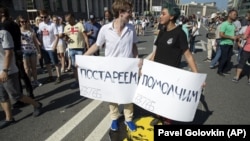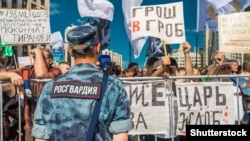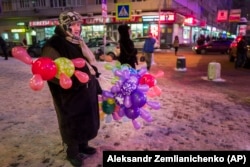On August 8, the U.S. announced additional sanctions against Russia for using chemical weapons in violation of the CBW Act (Chemical and Biological Weapons Control and Warfare Elimination Act of 1991).
Russia needs to be held responsible for “the use of a ‘Novichok”’ nerve agent in an attempt to assassinate UK citizen Sergei Skripal and his daughter Yulia Skripal,” the State Department spokeswoman Heather Nauert said in a statement.
Russia has denied any ties to the poisoning.
While the Kremlin’s response has been robust – accusing the U.S. “illegal and unfriendly” actions, Polygraph.info is looking at the claim from the Kremlin’s press secretary Dmitry Peskov that is verifiable:
Peskov said the sanctions would have no effect on Russia’s financial system, which has proven its stability when facing hardships, and that the government is keeping it “in proper state.”
Peskov’s claim is not entirely accurate.
Although the sanctions will not go into effect until August 22, they already are affecting the Russian economy.
“There is local panic on the currency market,” said BCS Brokerage, a Briltish firm that specializes in investments in Russia and the former Soviet nations called the Commonwealth of Independent States.
The ruble went to two-year lows August 9 and that sparked a wider asset sell-off over fears that Moscow was locked in a spiral of sanctions.
Russia’s financial stability assessments from the independent international observers highlight risks and further slowdown in growth.
The International Monetary Fund Russia’s financial stability report says, “The Russian economy is experiencing a protracted recession and faces significant risks. The sharp decline in oil prices has negatively affected growth, while sanctions have impaired access to international markets. These developments have exacerbated the pre-existing structural slowdown in growth and taken a toll on the banking system. The key risks include a weaker medium-term path for oil prices, the intensification of geopolitical tensions and sanctions, and a further slowdown in growth.”
The report notes that, “The authorities’ policies have helped to keep the banking system stable” however, “the banking system is weak and likely to need additional capital, and the governance continued to be weak and concentration of moral hazard increased.”
The Financial Stability Board – an international body that monitors and makes recommendations about the global financial system, said in a 2018 report, that Russia’s financial system “continued to suffer from weak governance, including sometimes non-transparent ownership structures and deficiencies in reporting. Despite progress achieved in previous years, the regulatory and supervisory framework still had gaps and weaknesses.”
Reuters reports the new sanctions come in two tranches. The first, which targets U.S. exports of sensitive national-security related goods, comes with deep exemptions and many of the items it covers have already been banned by previous restrictions.
The second tranche, according to Reuters, can be selectively activated after 90 days if Moscow fails to provide “reliable assurances” it will no longer use chemical weapons and blocks on-site inspections, is potentially more serious.
Almost 700 Russian people and companies currently are under U.S. sanctions. Individuals face limits on their travel and freezes on at least some of their assets, while some top Russian state banks and companies, including oil and gas giants, are effectively barred from getting financing through U.S. banks and markets.









